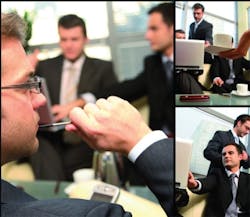Modeling mentors maximizes success
by Albert L. Ousborne Jr., DDS
For more on this topic, go to www.dentaleconomics.com and search using the following key words: mentoring, mentors, American Academy of Dental Practice Administration, Pankey Institute, Dr. Albert L. Ousborne Jr.In July of 1966, I completed my service in the Navy Dental Corp. It was now time to begin establishing a private practice. Working with Navy dentists from all over the country taught me a valuable lesson. Contrary to my beliefs, the Dental School of the University of Maryland really was not the very best in every department.Like me, you probably believed your alma mater was simply tops in everything. Working alongside dentists from other schools made me realize that, while Maryland was a very fine dental school, others had some departments that were even stronger. At that time, Maryland was exceptional in surgery and restorative dentistry. The dentists from Penn were strong in periodontics. The dentists from Boston were in the forefront in endodontics, while California and Washington schools excelled in prosthodontics.
Each of these schools had a common factor that determined their exceptional department strengths -the dentists heading up the department! These dentists were what we now call "world class." They were the leaders recognized in their field as being the very finest.
This experience was not only shocking, it was humbling. Each of us serving in the military quickly realized that we could learn from one another. Wow! What an incredible opportunity to mentor strengths and augment weaknesses. By working together, we all learned the value of mentoring and modeling.
Now, let me tell you a story. In 1967, a CE course was offered in New Jersey by Dr. Leo Hoffman on practice management. Fortunately, I took it. Leo was a mentor with a powerful message on how to create a successful practice. After he told me that the American Academy of Dental Practice Administration was the mother lode of knowledge for practice success, I begged him for a coveted one-day invitation.
Then, the organization always met in Chicago during the Midwinter Dental Meeting. The full 3½ days were limited to "members only," and the Academy was full at 200 members. Fortunately, my plea finally resulted in a one-day invitation, and I was off to Chicago that February for what would be synchronicity and a paradigm shift in my professional life.
After listening to an exciting morning of discussions on management, prosperity, and ergonomics, we were seated in a large room with tables of 10 for lunch. The elderly gentleman sitting next to me asked a lot of questions to which I had very few good answers. My deduction now is he took pity on this young "green" dentist.
Afterward, I recalled he wrote Rose Quick on the back of his card and explained she was his secretary. He asked me to call her and noted he would be glad to help me get my practice started with a solid philosophy, if I cared to spend time observing his practice. After he left the table, I asked those remaining, "Who is this Dr. Pankey?" It was another humbling experience. My "green" chroma continued to intensify.
A few months later, I hopped on a plane to Florida and found myself watching the master at work. I immediately realized Dr. Pankey had exquisite clinical skills and a deep understanding of occlusion. Most importantly, he revealed his values, beliefs, and attitudes in the creation of a philosophy of practice.
He introduced me to a little book, "The Go Getter," that revealed the meaning of true determination if one really has the burning desire for a worthy goal. He made it clear that whatever you seek, you can have if you are willing to "pay the price." I was privileged to spend time socially with Dr. Pankey at his home and office. The Institute, dedicated to this giant in dentistry, was just a beginning imaginative dream at this time.
The Dupont Plaza Hotel in Miami soon became a gathering center for those of us fortunate enough to have been influenced by this great mentor. Dr. Pankey was a champion at changing dentists' lives for great success. I will forever be indebted to him for helping me to establish my practice with principles of professionalism that will always endure. He helped so many of us find our North Star on the compass of life, as well as in dentistry.
So, why am I telling you all this? It's because mentors make such a positive difference for mastership. Baseball's Alex Rodriguez is the major league's highest paid player with a $252 million contract. As the American League's most valuable player, he has had a coach for 12 years.
Alex credits his coach for much of his success. Certainly, we all know how the greatest golfers, tennis players, musicians, conductors, baseball stars, orators, magicians, actors, comedians, singers, etc., have been groomed for success by great mentors. Here are a few other mentorships:
- Earl Shooff to Jim Rohn
- Jim Rohn to Tony Robbins
- Richard Burton to Sir Anthony Hopkins
- Johnny Carson to Jay Leno
- Woody Guthrie to Bob Dylan
- Margaret Thatcher to John Major
- Bing Crosby to Frank Sinatra
- Theodore Roosevelt to William Taft
- James Dean to Dennis Hopper
- Audrey Hepburn to Elizabeth Taylor
- Andrew Carnegie to Napoleon Hill
- Napoleon Hill to Earl Nightingale
Are you beginning to see the pattern? Dentistry is blessed with a number of great mentors. Nothing has influenced my success more than what I have learned from my interaction with them. Dr. Frank Spears, Dr. John Kois, Dr. Gordon Christensen, Dr. Peter Dawson, Dr. Omer Reed, and Dr. Bill Strupp have greatly contributed to my technical skills.
Linda Miles, J. P. Consultants, Sandy Roth, Bob Frazer, Avrom King, and Earl Nightingale have greatly contributed to enhancing my management and philosophy of practice. Each played a major role in shaping my quality of life. Many have been associated with the Pankey Institute and the AADPA organization.
It was at an AADPA meeting that I first met Dr. Bob Barclay, considered the father of preventive dentistry. Bob knew how to teach patients about their disease and motivate them to achieve ideal oral hygiene. While most dentists "chafed at the bit" to have Bob explain his "Control Program," those of us in the Academy knew that this mentor's abilities were successful because he had such a remarkable belief in his philosophy.
He also had studied the masters in behavioral psychology. More importantly, Bob's enthusiasm and beliefs could be casually assimilated by just being with him socially for a few days. What we learned from Bob was not just from the podium, but we learned in a social environment during personal conversations at this intimate meeting.
The AADPA seems to attract the leaders in practice management. When I first attended, I was surrounded by them. Harold Kilpatrick, the father of dental ergonomics and work simplification, highly influenced my thinking, together with the Milwaukee Dental Study Club.
These leaders were working with four-handed dentistry as far back as the 1950s. Academy members developed the reclining dental chair, the high-speed evacuation system, and functional mobile cabinets.
In fact, Francois Duret showed us the concept of CAD-CAM for dentistry back in the early 1970s. His presentation then was like "future shock." It would not come to fruition until 1985, when it was formally presented to the Association Dentaire FranÇaise Congress. How is that for innovation?
I cannot even begin to describe how many great developers of how we practice dentistry today have come together in this prestigious organization. You'll recognize many of them at the annual meeting, should you have the opportunity to attend as a guest. You'll also notice that they fly high above the turkeys. They fly with the eagles!
They are out there and you can rub feathers with them and experience coming under their wing at this exciting gathering of top management leaders. Dr. Joe Blaes met one of his mentors, Dr. Roy Wolff, at AADPA. In fact, I met Dr. Joe Blaes at AADPA as well. We've learned from one another, trading ideas and comparing notes, ever since. Joe is a wonderful mentor.
I hope my story will inspire you to seek out a mentor. Maybe it will inspire you to attend the Pankey Institute or the Academy's meeting in March 2011. Maybe you will have an eye-opening, humbling experience as I did, realizing there are dental giants out there willing to put you on their shoulders so you, too, can see what they see, what they do, and how they do it.
The AADPA has been one of our profession's best kept secrets for years. Presently, there are some openings for an invitation to join as a guest. If you have the "right stuff," you could be sponsored for membership in a few years. Consider the opportunity. You can call Kathy Uebel, the AADPA's executive secretary, at (800) 689-7515, and she will help you obtain a sponsor from your area for a guest invitation. Give it serious consideration, act on it, and then I'll see you at the top!
Albert L. Ousborne Jr., DDS, is a practicing dentist in Towson, Md. He has served as president of the American Academy of Dental Practice Administration, and lectures on creating a successful practice with professionalism. You may contact him by telephone at (410) 828-1177.

